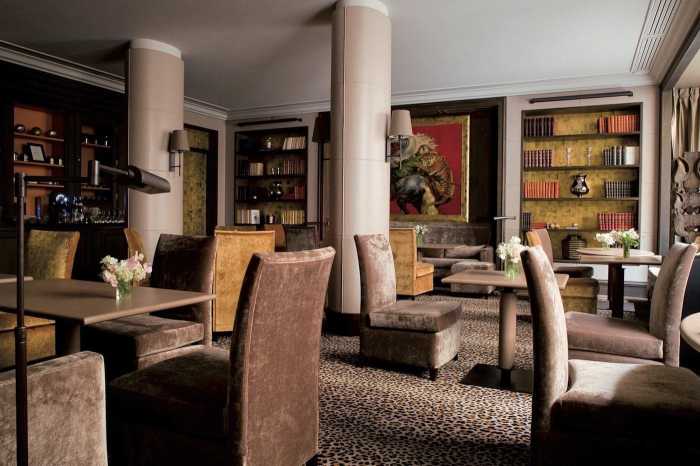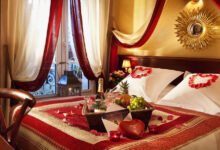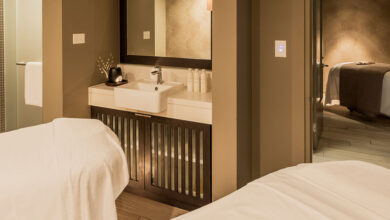Boutique Hotels A Unique Hospitality Experience
Boutique Hotels represent a fascinating niche in the hospitality industry, offering a distinct alternative to large hotel chains. They prioritize personalized service, unique design, and a curated guest experience, often located in charming, historic, or culturally significant areas. This focus on individuality attracts a discerning clientele seeking more than just a place to sleep; they’re looking for an experience that reflects their own style and preferences.
From the architectural style and interior design to the amenities and services provided, boutique hotels strive to create a memorable and immersive stay. This dedication to craftsmanship and attention to detail sets them apart, resulting in a loyal following of travelers who appreciate the personalized touch and unique character each hotel offers.
Defining Boutique Hotels

Source: covingtontravel.com
Boutique hotels offer a unique and personalized travel experience, setting themselves apart from the standard hotel model through a combination of intimate scale, distinctive design, and exceptional service. They prioritize creating a memorable stay by focusing on curated details and a strong sense of place, rather than simply providing accommodation.Boutique hotels are characterized by their smaller size, typically featuring fewer than 100 rooms.
This allows for a more personalized and attentive service, fostering a closer connection between staff and guests. Unlike larger chains, boutique hotels often embrace a distinct theme or style, reflecting the local culture or a specific design aesthetic. This individuality extends to their amenities, which are carefully chosen to enhance the overall experience, rather than simply providing a comprehensive list of options.
Boutique Hotels Compared to Luxury and Budget Hotels
Boutique hotels occupy a unique space within the hospitality industry, differentiating themselves from both luxury and budget hotels. While luxury hotels emphasize opulence and extensive amenities, boutique hotels prioritize curated experiences and personalized service. They may offer luxurious features, but the focus is on quality and uniqueness rather than sheer extravagance. Budget hotels, on the other hand, prioritize affordability and basic functionality.
Boutique hotels, while sometimes offering competitive rates, typically focus on a higher level of quality and personalized service, justifying a price point above budget options. The key difference lies in the overall experience: luxury hotels offer extravagance, budget hotels offer affordability, and boutique hotels offer a carefully crafted, unique stay.
Target Audience for Boutique Hotels
The typical guest at a boutique hotel values unique experiences and personalized service. They are often discerning travelers seeking an escape from the uniformity of large hotel chains. This audience appreciates attention to detail, local character, and a sense of exclusivity. They might be business travelers seeking a more sophisticated and comfortable workspace away from the typical business hotel, or leisure travelers looking for a memorable and authentic experience in their chosen destination.
Think of a couple celebrating an anniversary, a group of friends on a weekend getaway, or a solo traveler seeking a relaxing and enriching experience. These guests are willing to pay a premium for a high-quality, individualized experience.
Key Design Elements of Boutique Hotels
Boutique hotels prioritize unique and carefully curated design elements. These hotels often incorporate local artistry and craftsmanship, reflecting the character of their surroundings. Expect to find locally sourced materials, bespoke furniture, and unique artwork throughout the hotel. The overall design aims to create a distinct atmosphere, reflecting a specific theme or style, whether it’s modern minimalist, rustic charm, or vibrant eclecticism.
Think handcrafted details, locally sourced textiles, and a color palette inspired by the surrounding environment. The design is not just about aesthetics; it’s about creating an immersive and memorable experience for the guest, reinforcing the hotel’s unique personality and contributing to its overall appeal.
Location and Market Analysis
The success of a boutique hotel hinges significantly on its location and a thorough understanding of the surrounding market. Choosing the right spot involves careful consideration of demographics, tourism trends, and the competitive landscape. A well-executed market analysis informs strategic decisions, from pricing and amenities to marketing and overall brand positioning.
Ideal Locations for Boutique Hotels
Boutique hotels thrive in locations that offer a unique experience and cater to specific clientele. High-end tourist destinations, vibrant city centers with cultural attractions, and charming historic districts are prime examples. Areas with a strong concentration of affluent residents or business travelers also present attractive opportunities. Demographic factors such as average income, age distribution, and travel preferences should be carefully analyzed.
For instance, a boutique hotel focusing on eco-tourism might find success in a region known for its natural beauty and commitment to sustainable practices, attracting a clientele interested in environmentally conscious travel. Conversely, a luxury boutique hotel targeting business executives might flourish in a bustling city center with easy access to corporate offices and transportation hubs.
Competitive Landscape Analysis
Analyzing the competitive landscape involves identifying existing boutique hotels and other accommodation options in the target area. This includes evaluating their pricing strategies, target markets, amenities, and overall brand positioning. Understanding the strengths and weaknesses of competitors is crucial for developing a unique selling proposition (USP) that sets the boutique hotel apart. For example, a coastal town might have several established boutique hotels, each focusing on a specific niche – one might emphasize romantic getaways, another might target families, and a third might cater to adventure travelers.
A thorough competitive analysis will reveal any gaps in the market and identify opportunities to offer something unique and desirable.
Marketing Strategy for a Hypothetical Boutique Hotel
Let’s consider a hypothetical boutique hotel, “The Coastal Gem,” located in a charming seaside town known for its art scene and relaxed atmosphere. The target market is couples and individuals seeking a romantic and culturally enriching getaway. The marketing strategy would leverage the hotel’s unique location and ambiance. This would involve:
- Targeted online advertising: Utilizing platforms like Instagram and Pinterest to showcase the hotel’s aesthetic appeal and highlight local art and cultural experiences.
- Partnerships with local businesses: Collaborating with art galleries, restaurants, and tour operators to offer bundled packages and create unique experiences for guests.
- Public relations: Securing features in travel blogs and magazines to increase brand awareness and attract potential guests.
- Email marketing: Building an email list to promote special offers and upcoming events.
SWOT Analysis for a Sample Boutique Hotel Business Plan
A SWOT analysis is essential for assessing the viability of a boutique hotel business. Let’s analyze “The Coastal Gem” again:
| Strengths | Weaknesses |
|---|---|
| Unique location in a desirable tourist destination | Limited parking availability |
| High-quality amenities and personalized service | High operating costs in a competitive market |
| Strong brand identity and unique selling proposition | Potential seasonality impacting occupancy rates |
| Opportunities | Threats |
| Growing demand for unique travel experiences | Economic downturn affecting travel spending |
| Potential for partnerships with local businesses | Increased competition from larger hotel chains |
| Expansion of services (e.g., spa, yoga retreats) | Negative reviews or online reputation damage |
Services and Amenities
Boutique hotels pride themselves on offering a curated experience that goes beyond the basics. They achieve this through a combination of unique services, carefully selected amenities, and a commitment to personalized attention, all designed to create lasting memories for their guests. This focus on exceptional service differentiates them from larger hotel chains, and is a key factor in their appeal to discerning travelers.
The services and amenities offered by boutique hotels are carefully chosen to reflect the hotel’s unique character and target market. This might involve incorporating local culture, showcasing regional art, or emphasizing a specific theme, such as sustainability or wellness.
Unique and Memorable Services Offered by Boutique Hotels
Boutique hotels often go the extra mile to provide memorable experiences. These services might include personalized concierge services that arrange unique activities, such as private wine tastings, cooking classes with local chefs, or guided tours of hidden gems in the area. Some hotels offer curated experiences tailored to individual guest preferences, such as bespoke spa treatments, private yoga sessions, or even personalized itineraries designed around their interests.
For example, a boutique hotel in Tuscany might offer a private truffle hunting experience followed by a gourmet meal featuring the foraged delicacies. Another might partner with a local artist to offer exclusive painting classes for guests.
Amenities that Enhance the Guest Experience in Boutique Hotels
The amenities offered by boutique hotels are carefully chosen to create a luxurious and comfortable atmosphere. While the specific amenities will vary depending on the hotel’s concept and location, some common features include high-quality bedding and linens, luxurious bath products, complimentary Wi-Fi, and well-equipped fitness centers. However, boutique hotels often go beyond the standard amenities, offering unique touches that elevate the guest experience.
- Complimentary welcome drinks or snacks upon arrival.
- Access to a well-stocked library or reading room.
- Loaner bicycles for exploring the local area.
- In-room coffee machines with gourmet coffee beans.
- Turndown service with personalized touches, such as a handwritten note.
Comparison of Guest Service Standards
Boutique hotels typically prioritize personalized service over standardized procedures, unlike larger hotel chains. While large chains often rely on efficient, streamlined processes, boutique hotels focus on building relationships with guests and anticipating their needs. This personalized approach results in a more intimate and memorable experience. For instance, a guest at a large chain hotel might receive a generic welcome message, while a guest at a boutique hotel might receive a handwritten note welcoming them by name and referencing their travel plans, if known.
The Importance of Personalized Service in the Boutique Hotel Context
Personalized service is paramount to the success of boutique hotels. It is the core differentiator that sets them apart from larger hotel chains. This might involve remembering a guest’s preferences from previous stays, anticipating their needs before they are even voiced, or simply offering a genuine and friendly interaction. This attention to detail creates a sense of connection and loyalty, encouraging repeat business and positive word-of-mouth referrals.
For example, a boutique hotel might remember a guest’s preference for a specific type of pillow or their favorite cocktail, ensuring these items are readily available upon their return.
Branding and Marketing: Boutique Hotels
Successfully marketing a boutique hotel requires a strong brand identity and a targeted marketing strategy that leverages the unique aspects of the boutique experience. This goes beyond simply advertising rooms; it’s about selling a feeling, a lifestyle, and a memorable stay.
Brand Identity: The “Serene Shores” Boutique Hotel
Our fictional boutique hotel, “Serene Shores,” will be positioned as a luxurious, tranquil escape offering personalized service and a sophisticated atmosphere. The logo will feature a stylized wave design incorporating a subtle palm tree silhouette, evoking a sense of calm and coastal elegance. The color palette will consist of soft blues, sandy beiges, and accents of deep teal, reflecting the ocean and beach environment.
The tagline will be: “Unwind. Rejuvenate. Rediscover.” This concise phrase encapsulates the core experience Serene Shores aims to provide.
Marketing Campaign: Highlighting Unique Selling Points
The marketing campaign for Serene Shores will focus on its unique selling propositions: personalized service, luxurious amenities, and a stunning location. We’ll emphasize the personalized concierge service, offering curated experiences tailored to individual guest preferences. High-quality photography and videography showcasing the hotel’s elegant rooms, stunning ocean views, and exceptional amenities (e.g., a private beach access, a rooftop infinity pool, a spa) will be central to the campaign.
Targeted advertising will be used to reach potential guests interested in luxury travel, wellness retreats, and romantic getaways. Print advertisements in luxury travel magazines will complement online campaigns. We will also partner with local businesses (e.g., high-end restaurants, spas) to create exclusive packages for guests.
Social Media and Online Platforms
Social media will be crucial for reaching a wide audience and building brand awareness. Instagram will be the primary platform, showcasing stunning visuals of the hotel and its surroundings. Facebook will be used for engaging with potential guests and building a community. We’ll utilize targeted advertising on these platforms to reach specific demographics. A professionally designed website with high-quality photography, virtual tours, and online booking capabilities is essential.
Influencer marketing will also be employed, collaborating with travel bloggers and influencers to generate authentic content and reach a wider audience. We will track key metrics (e.g., website traffic, social media engagement, booking conversions) to measure campaign effectiveness and make necessary adjustments.
Online Reviews and Reputation Management
Online reviews are critical for boutique hotels, as potential guests heavily rely on them when making booking decisions. Active reputation management is crucial. We will actively monitor review sites (e.g., TripAdvisor, Google Reviews) and respond promptly to both positive and negative reviews. Positive reviews will be highlighted, and negative reviews will be addressed professionally and constructively, demonstrating a commitment to guest satisfaction.
We will encourage satisfied guests to leave positive reviews by providing exceptional service and offering incentives, such as a small gift or discount on a future stay. Proactive measures will be implemented to address potential issues before they escalate into negative reviews.
Comparison of Marketing Strategies
| Marketing Strategy | Strengths | Weaknesses | Cost |
|---|---|---|---|
| Social Media Marketing | Wide reach, cost-effective, high engagement potential | Requires consistent effort, algorithm changes can impact reach | Low to Medium |
| Email Marketing | Targeted messaging, high conversion rates, measurable results | Requires a strong email list, can be perceived as spam | Low to Medium |
| Public Relations | Builds credibility, generates positive media coverage | Can be time-consuming, difficult to control the message | Medium to High |
| Paid Advertising (e.g., Google Ads) | Targeted reach, measurable results, quick impact | Can be expensive, requires ongoing management | Medium to High |
Design and Architecture
Boutique hotels stand apart through their distinctive design and architecture, carefully curated to reflect a specific brand identity and create a memorable guest experience. The architectural style, interior design, and sustainable practices all play crucial roles in achieving this unique atmosphere.Architectural Styles in Boutique Hotel DesignBoutique hotels often embrace a variety of architectural styles, drawing inspiration from the building’s history, local context, and the overall brand aesthetic.
A historic building might be renovated to retain its original charm, while a new build could incorporate modern minimalist designs or embrace a more traditional regional style. The choice of style is paramount in establishing the hotel’s character and setting the tone for the guest experience. For instance, a hotel in a bustling city might adopt a sleek, contemporary style, whereas a rural retreat might opt for a rustic, farmhouse aesthetic.
The key is consistency and cohesion between the architecture and the overall brand identity.
Interior Design’s Role in Atmosphere Creation
Interior design is the cornerstone of a boutique hotel’s unique atmosphere. It’s more than just aesthetics; it’s about creating a mood, telling a story, and providing a comfortable and engaging environment for guests. The selection of furniture, fabrics, lighting, and artwork all contribute to the overall ambiance. A carefully curated collection of vintage pieces alongside contemporary art can create a sophisticated and eclectic atmosphere, while a minimalist approach with natural materials might evoke a sense of calm and serenity.
The details, from the textures of the fabrics to the choice of lighting fixtures, contribute to the overall sensory experience. A consistent design language throughout the hotel ensures a cohesive and immersive experience for guests.
Sustainable Design Principles in Boutique Hotels
Increasingly, boutique hotels are incorporating sustainable design principles into their architecture and interiors. This can involve using locally sourced materials, employing energy-efficient technologies, and minimizing waste. For example, reclaimed wood can be used in flooring and furniture, while rainwater harvesting systems can reduce water consumption. Green roofs and solar panels can further reduce the hotel’s environmental impact.
The use of sustainable materials not only benefits the environment but can also enhance the hotel’s appeal to environmentally conscious travelers. Furthermore, many guests appreciate a hotel’s commitment to sustainability, making it a significant selling point.
The “Serene Sanctuary” Boutique Hotel: Design and Architecture
Imagine the “Serene Sanctuary,” a boutique hotel nestled in a quiet vineyard region. The architecture is a blend of modern and rustic styles, utilizing locally sourced stone and reclaimed wood. Large windows offer stunning vineyard views, while exposed beams and high ceilings create a sense of spaciousness. The color palette is warm and earthy, featuring muted greens, browns, and creams, accented with pops of deep burgundy inspired by the surrounding vineyards.
The furniture is a mix of handcrafted pieces and carefully selected vintage finds. Natural materials like linen, wool, and cotton are used throughout, creating a feeling of warmth and comfort. Lighting is soft and ambient, creating a relaxing atmosphere. Artwork features local artists, showcasing the region’s natural beauty and cultural heritage.
“Our design philosophy for the Serene Sanctuary is centered around creating a space that feels both luxurious and intimately connected to the surrounding nature. We believe in using natural materials and a calming color palette to foster a sense of tranquility and well-being for our guests. Every detail, from the handcrafted furniture to the carefully selected artwork, is chosen to tell a story and create a memorable experience.”
Amelia Stone, Lead Interior Designer
Financial Aspects and Operations
Running a boutique hotel presents a unique blend of financial challenges and exciting opportunities. While the potential for high profit margins exists due to the premium pricing model, careful financial planning and efficient operations are crucial for success. Understanding the intricacies of revenue generation, cost management, and leveraging technology is essential for long-term viability.
Financial Challenges and Opportunities
Boutique hotels often face higher initial investment costs compared to larger chain hotels. This is primarily due to the emphasis on unique design, personalized service, and often, smaller scale operations which may lack economies of scale. However, the opportunity lies in commanding higher average daily rates (ADR) due to the exclusive experience offered. This higher ADR can offset the higher operating costs and generate strong revenue streams, provided occupancy rates remain healthy.
Furthermore, the potential for strong brand loyalty and positive word-of-mouth marketing can lead to sustained revenue growth and reduced reliance on expensive advertising campaigns. A successful boutique hotel carefully balances these initial investment costs against the potential for higher returns through strategic pricing and operational efficiency.
Revenue Generation Strategies Beyond Room Rentals
Boutique hotels can significantly boost their revenue streams beyond simply renting rooms. A well-executed strategy might include offering curated experiences like private wine tastings, cooking classes focusing on local cuisine, or exclusive spa treatments. These add-on services cater to the discerning clientele attracted to boutique properties and command premium prices. Furthermore, partnering with local businesses for package deals, such as combining hotel stays with tours or tickets to local events, can generate additional revenue and enhance the guest experience.
Finally, the unique character of a boutique hotel often lends itself to hosting private events such as weddings, corporate retreats, or special celebrations, further diversifying income sources.
Effective Operational Management
Effective operational management is paramount in a boutique hotel. Unlike larger chains with standardized procedures, boutique hotels require a highly adaptable and personalized approach. This includes meticulous attention to detail in areas such as staff training (emphasizing exceptional customer service), inventory management (optimizing stock levels without overspending), and maintaining high standards of cleanliness and upkeep. Streamlined processes and effective communication between departments are crucial for efficient operations and guest satisfaction.
Regular performance reviews and staff motivation are key components of ensuring consistent service quality. Careful scheduling and efficient task delegation are also crucial for maximizing productivity and minimizing labor costs.
Technology’s Role in Efficiency and Guest Experience, Boutique Hotels
Technology plays a pivotal role in enhancing both efficiency and the guest experience in boutique hotels. Property Management Systems (PMS) streamline reservations, guest communication, and billing, reducing administrative workload and improving accuracy. Online booking platforms and revenue management tools allow for dynamic pricing strategies, maximizing occupancy and revenue. Guest-facing technologies, such as mobile check-in/check-out, digital key systems, and in-room tablets providing access to hotel services and local information, enhance convenience and create a seamless, personalized experience.
Furthermore, implementing customer relationship management (CRM) systems allows for personalized marketing and targeted offers, fostering guest loyalty and repeat business.
Boutique Hotel Financial Overview
| Start-up Costs | Operating Costs | Revenue Streams | Example (USD) |
|---|---|---|---|
| Property acquisition/renovation, permits, licenses, initial staffing, furniture, fixtures, equipment (FF&E) | Salaries, utilities, maintenance, marketing, supplies, insurance | Room rentals, food and beverage sales, spa services, event rentals, curated experiences, partnerships | $1,000,000 – $5,000,000+ (depending on size and location) |
| Detailed financial modeling is crucial and will vary widely depending on factors like location, size, and level of luxury. | Costs can be reduced through efficient energy management, smart procurement, and staff training. | Revenue diversification is key to mitigating risk and maximizing profitability. | Ongoing financial analysis and adjustment are essential for success. |
Guest Experience and Reviews
In the competitive landscape of the hospitality industry, creating a memorable guest experience is paramount for boutique hotels. Positive reviews and strong word-of-mouth referrals are essential for building a sustainable business and attracting new clientele. Conversely, negative reviews can significantly impact a hotel’s reputation and bottom line, highlighting the critical need for proactive management of guest feedback.
The Importance of Memorable Guest Experiences
A memorable guest experience transcends simply providing a comfortable bed and clean room. It encompasses every interaction a guest has with the hotel, from the initial booking process to the final checkout. This includes the friendliness and helpfulness of staff, the quality of amenities and services offered, the overall ambiance and design of the hotel, and even the smallest details like a handwritten welcome note or a complimentary local treat.
A positive experience fosters loyalty, encourages repeat bookings, and generates positive word-of-mouth marketing, far more valuable than any paid advertisement. Conversely, a negative experience can quickly spread through online review platforms, damaging the hotel’s reputation and deterring potential guests.
Examples of Positive and Negative Guest Reviews and Their Resolution
Positive reviews often highlight specific aspects of the hotel that exceeded expectations. For example, a review might praise the exceptional service provided by a particular staff member, the unique character and charm of the hotel’s design, or the delicious breakfast offered. A positive review might state: “The staff were incredibly friendly and helpful, going above and beyond to ensure our stay was perfect.
The hotel itself was beautifully designed and had a wonderful atmosphere.”Negative reviews, on the other hand, typically focus on areas needing improvement. A negative review might complain about noise levels, uncleanliness, or unresponsive staff. For instance: “The room was noisy due to street traffic, and the cleanliness was subpar. We tried to contact the front desk multiple times, but our calls were not answered promptly.” Addressing negative reviews promptly and professionally is crucial.
A timely and sincere response demonstrating a commitment to resolving the issue can often turn a negative experience into a positive one, showcasing the hotel’s commitment to guest satisfaction. For example, a response to the negative review above could offer a sincere apology, explain the steps taken to address the noise issue and improve cleanliness standards, and potentially offer a discount on a future stay.
Strategies for Collecting and Responding to Guest Feedback
Several strategies can be employed to effectively collect and respond to guest feedback. These include: utilizing online review platforms like TripAdvisor and Booking.com to monitor reviews and respond to comments; implementing guest comment cards or suggestion boxes within the hotel; conducting post-stay surveys via email; and employing a customer relationship management (CRM) system to track guest interactions and preferences.
Consistent monitoring and timely responses are key to managing online reputation and improving services based on guest feedback.
Methods for Building a Loyal Customer Base
Building a loyal customer base requires a multi-pronged approach. This includes providing exceptional service, personalized attention, and memorable experiences. Loyalty programs offering discounts or exclusive amenities for repeat guests can also be highly effective. Direct communication with guests through email newsletters or social media updates can keep them engaged and informed about special offers or hotel events.
Creating a strong brand identity that resonates with the target audience is also essential for attracting and retaining loyal customers. For example, a boutique hotel focusing on eco-tourism might attract a loyal base of environmentally conscious travelers by highlighting its sustainable practices and commitment to local communities.
Closure
Ultimately, the success of a boutique hotel hinges on its ability to craft a truly unforgettable guest experience. By blending impeccable service, distinctive design, and a strong brand identity, these hotels cater to a specific market segment seeking a unique and personalized stay. The future of boutique hotels looks bright, with continued growth and innovation shaping the landscape of this increasingly popular hospitality sector.
Their focus on creating authentic and memorable experiences ensures they will continue to attract discerning travelers worldwide.
Essential Questionnaire
What is the average price range for a boutique hotel?
The price varies significantly depending on location, amenities, and overall luxury level. Generally, boutique hotels are positioned at the mid-range to luxury end of the market.
Are boutique hotels suitable for families?
Some boutique hotels cater specifically to families, offering connecting rooms or suites, while others may be better suited for couples or solo travelers. It’s essential to check the hotel’s specific offerings and amenities before booking.
How do I find a boutique hotel that matches my preferences?
Utilize online travel agencies, specialized booking websites focusing on boutique hotels, and read reviews to find hotels that align with your desired style, location, and amenities.
What are the typical sizes of boutique hotels?
Boutique hotels are generally smaller than large hotel chains, typically ranging from a few dozen to a few hundred rooms. This smaller size allows for more personalized service and a more intimate atmosphere.
Are pets allowed in boutique hotels?
Pet policies vary widely. Always check the hotel’s specific pet policy before booking to avoid any surprises.







